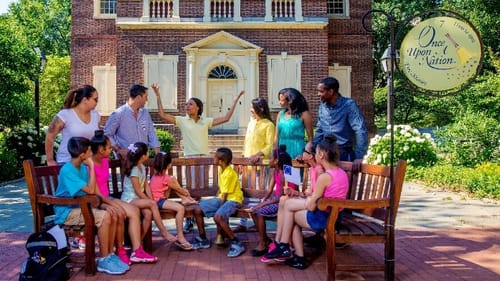Stay in the Loop
BSR publishes on a weekly schedule, with an email newsletter every Wednesday and Thursday morning. There’s no paywall, and subscribing is always free.
We have to grow up. So does our country.
On Independence Day 2022, is our democracy failing? Not if we listen to our children.

This year, Independence Day finds the United States at a breaking point: amid divisiveness, rage, and violence, many are predicting the collapse of our democracy. However, the US is a very young country—still in its adolescence—and there are strong parallels between an individual’s growth and development and the growth and development of a country.
As a clinical social worker, family-life educator, and group psychotherapist (as well as a mom of four), I know that adolescence is a stormy period of transition: unresolved internal conflicts come to a roaring head. It’s when we begin the difficult but necessary process of figuring out who we are, what we stand for, how we wish to live our lives, and ridding ourselves of what deters a fulfilling life. Our country must do the same.
Proclaiming liberty?
From day one of my student arrival to Philadelphia, I was elated to be in the city where our Revolutionary history is clearly marked on our streets, where we can visit the actual room of the birth of our Constitution—despite the omissions that continue to ricochet through our society today.
Throughout history, “good people” have refused to see the evils of systemic injustices.
When I was a child growing up in Baltimore, the ugliness of prejudice was a relentless backdrop: Jim Crow laws, and carefully placed signs reading “Restricted: No Jews, Negroes, or Dogs Allowed.” I vividly remember a field-trip bus ride to Philadelphia to visit the Liberty Bell. Our teacher proudly explained that “Proclaim Liberty throughout the Land unto all the inhabitants thereof” (Leviticus 25:10) is engraved on the bell. But my teacher never mentioned the contradiction between those words and the atrocities lived and breathed in my hometown.
Dignity and adulthood
In a democracy, the direction of a country depends upon the maturity and capacities of its citizenry. But millions of US children are denied the opportunity to achieve that growth, or in other words, a sense of dignity. Thanks to the findings of Dr. Eli Marcovitz, we know that dignity requires the combination of pride and humility that underpins mental health; for it to develop, a child must be nurtured, protected, and valued—in other words, loved. Even if parents don’t provide this foundation, other adults can. It is well-documented that the inability to develop a sense of dignity leads to unhealthy, destructive personality attributes that impact families, workplaces, and communities.
According to researcher and psychiatrist B. D. Perry, an environment of poverty, neglect, or violence can seriously impair children’s neurodevelopment, diminishing their ability to tolerate ambivalence, develop creative reasoning, and learn coping skills when confronted with challenges. Adolescents who grow up with safety and support begin to take responsibility for their own inner changes, and realize that health involves caring for others. But those who are ill-equipped for these challenges often exhibit threatening behaviors, including intimidation and violence. They become aging children who are adults in chronology only.

The biggest challenge of adolescence is separation from parental figures—often a frightening, interior process to define yourself and your direction. Lacking a reliable support system for this process can stunt emotional growth while our conscience continues to develop, damaging the emotional sense of direction we need to navigate life’s slippery slopes. A healthy adolescent journey lets us learn the difference between our own needs and the care we show to others, and the difference between the fantasy of “falling in love” and the active art of loving others.
Those denied a home where they experience love, safety, and permission to define their lives are often attracted to cruel, controlling lovers and partners, and are more easily dominated by dangerous professional and societal leaders. Or they become such lovers, partners, or leaders.
Washington’s warning
In his prescient 1796 presidential farewell address, George Washington warned of the danger of morally impaired leadership: “Cunning, ambitious, and unprincipled men will be enabled to subvert the power of the people and to subvert for themselves the reins of government.”
History proves that democracies fail either by coup or by erosion, when extreme polarization is intensified by political leaders who tell the people that democracy is a failure …after they adopt every possible measure to undermine it, including inciting political violence. Finally, they convince voters that control by an autocrat is their only protection.
Although our societal problems were not created by Donald Trump, they intensified during his presidency. Rather than address our problems, he pitted Americans against each other, encouraged violence, and used fear, shame, and intimidation to undermine belief in the democratic process.
Unprincipled leaders attract political enablers who offer their support in exchange for privilege and power over others. People who lacked safety and love in their formative years are also vulnerable to these leaders, offering them cultlike adoration. They see cruelty as strength, living under the illusion that their unquestioned obedience will finally win them acceptance and love. Still others follow dangerous leadership because they believe that others have disregarded their past sacrifices and concerns. And people who simply withdraw, through fear of retaliation by vindictive leadership, or the belief that their voices are meaningless or that democracy is not worth saving, become passive supporters of these toxic leaders as well.
The priority we need
In this backdrop, America’s youngsters struggle and suffer. Overwhelmed by negativity, conflict, and doomsday predictions, far too many will grow up to numb themselves in dangerous ways, with dire rates of burnout, depression, and suicide. They are my patients. In our work together, they bemoan “the power-consumed white men who hold America in a noose,” the “self-centeredness and constant complaints of adults who say over and over that the golden age of America is over; the future bleak,” the “blinding rage everywhere.” They ask: "Where is courage and common sense in today’s world?” and “Is life worth living?"

Just like maturing teenagers, the health of our country depends on separation from forces that threaten the promise of a more perfect union. More than 2,500 years ago, the Greek philosopher Heraclitus put it this way: “A man’s conscience is his fate.” The same is true for a country.
America’s priority must be to safeguard the educational, physical, and emotional health of our nation’s young people, who are our future. We cannot do this without listening to them. We must encourage their voices in productive planning for the future, and reach out to those who have retreated from the democratic process. We can accomplish more than we think.
Will the US grow up?
The turbulence of growing up is normal, whether it’s a teenager or a nation, but the US urgently needs a new path. Our agonizing American reality of election lies, mass shootings, racism, and the loss of reproductive rights must be faced with hope, resilience, and determination. Our children must see us wrap our arms around our suffering country, as we would a child who has betrayed the best we offer, and replace despair and negativity with commitment, grit, and involvement—the “good trouble” the extraordinary John Lewis demonstrated throughout his lifetime.
The next years will be stormy and dangerous, but voices of hope and reason will continue to emerge, especially if we nurture our children. Whether or not the United States of America grows up depends on us. If we face the stony path toward maturity, we will safeguard democracy, and America cannot, will not, fail to attain a brighter future for all.
Sign up for our newsletter
All of the week's new articles, all in one place. Sign up for the free weekly BSR newsletters, and don't miss a conversation.

 SaraKay Smullens
SaraKay Smullens